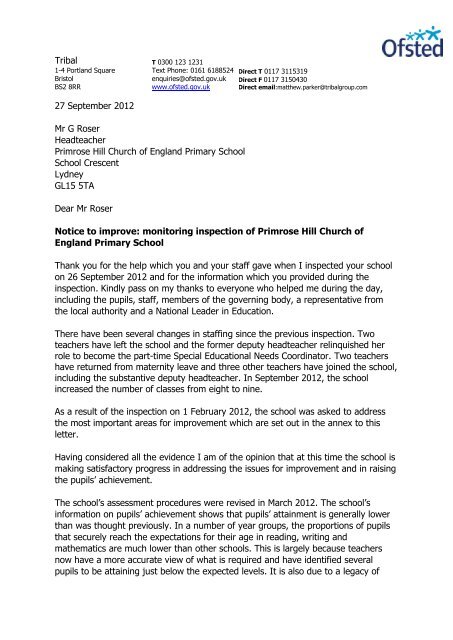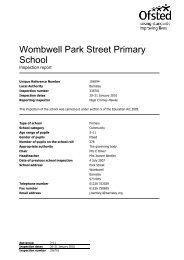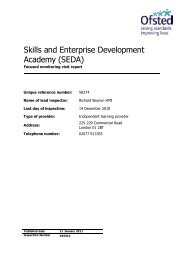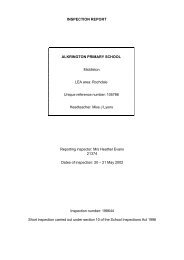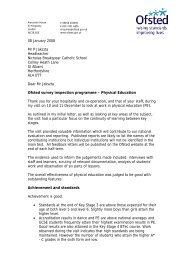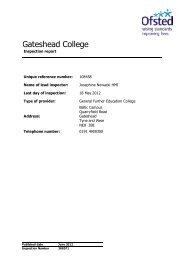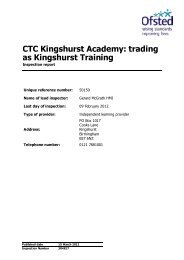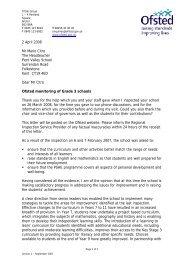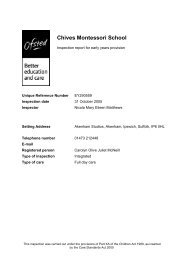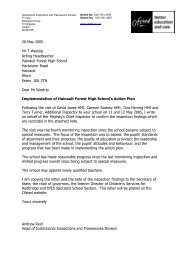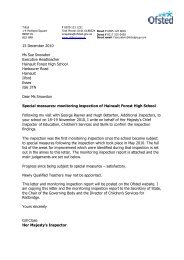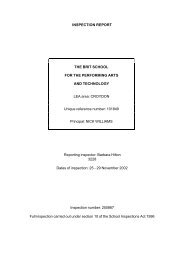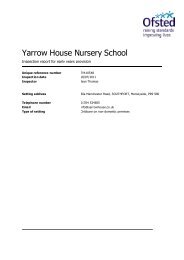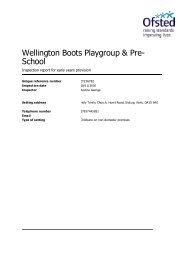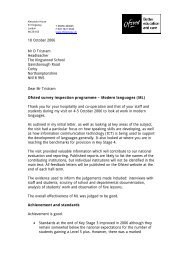27 September 2012 Mr G Roser Headteacher Primrose Hill ... - Ofsted
27 September 2012 Mr G Roser Headteacher Primrose Hill ... - Ofsted
27 September 2012 Mr G Roser Headteacher Primrose Hill ... - Ofsted
Create successful ePaper yourself
Turn your PDF publications into a flip-book with our unique Google optimized e-Paper software.
Tribal<br />
1-4 Portland Square<br />
Bristol<br />
BS2 8RR<br />
<strong>27</strong> <strong>September</strong> <strong>2012</strong><br />
<strong>Mr</strong> G <strong>Roser</strong><br />
<strong>Headteacher</strong><br />
<strong>Primrose</strong> <strong>Hill</strong> Church of England Primary School<br />
School Crescent<br />
Lydney<br />
GL15 5TA<br />
Dear <strong>Mr</strong> <strong>Roser</strong><br />
T 0300 123 1231<br />
Text Phone: 0161 6188524<br />
enquiries@ofsted.gov.uk<br />
www.ofsted.gov.uk<br />
Direct T 0117 3115319<br />
Direct F 0117 3150430<br />
Direct email:matthew.parker@tribalgroup.com<br />
Notice to improve: monitoring inspection of <strong>Primrose</strong> <strong>Hill</strong> Church of<br />
England Primary School<br />
Thank you for the help which you and your staff gave when I inspected your school<br />
on 26 <strong>September</strong> <strong>2012</strong> and for the information which you provided during the<br />
inspection. Kindly pass on my thanks to everyone who helped me during the day,<br />
including the pupils, staff, members of the governing body, a representative from<br />
the local authority and a National Leader in Education.<br />
There have been several changes in staffing since the previous inspection. Two<br />
teachers have left the school and the former deputy headteacher relinquished her<br />
role to become the part-time Special Educational Needs Coordinator. Two teachers<br />
have returned from maternity leave and three other teachers have joined the school,<br />
including the substantive deputy headteacher. In <strong>September</strong> <strong>2012</strong>, the school<br />
increased the number of classes from eight to nine.<br />
As a result of the inspection on 1 February <strong>2012</strong>, the school was asked to address<br />
the most important areas for improvement which are set out in the annex to this<br />
letter.<br />
Having considered all the evidence I am of the opinion that at this time the school is<br />
making satisfactory progress in addressing the issues for improvement and in raising<br />
the pupils’ achievement.<br />
The school’s assessment procedures were revised in March <strong>2012</strong>. The school’s<br />
information on pupils’ achievement shows that pupils’ attainment is generally lower<br />
than was thought previously. In a number of year groups, the proportions of pupils<br />
that securely reach the expectations for their age in reading, writing and<br />
mathematics are much lower than other schools. This is largely because teachers<br />
now have a more accurate view of what is required and have identified several<br />
pupils to be attaining just below the expected levels. It is also due to a legacy of
weaker teaching in some classes. That said, the school’s most recent progress<br />
information and pupils’ work seen in a sample of books confirm that rates of<br />
progress have picked up across the school and most pupils are on track to make the<br />
progress expected in English and mathematics across Key Stage 2. Brief<br />
observations of literacy lessons show that training for staff in teaching writing is<br />
making a difference, particularly for boys, and significant proportions of pupils<br />
regained ground in the last term. The attainment of Year 6 pupils that left the school<br />
in July was in line with most schools in English and mathematics and around a third<br />
had made exceptional progress across Key Stage 2 in reading and mathematics.<br />
Improvements to teaching are not yet established. While pupils made strong<br />
progress in some year groups last term, the improvement was less evident for<br />
others.<br />
Pupils believe that the new system of sanctions and rewards has improved behaviour<br />
and that weekly reward time is more purposeful. They commented positively on the<br />
lengths that teachers go to, to make their learning interesting. In lessons, pupils<br />
listened attentively and were keen to answer the teacher’s questions.<br />
The headteacher, supported by external partners, has implemented a robust plan for<br />
improving the quality of teaching and raising pupils’ achievement. The senior<br />
leadership team meets frequently with a member of the governing body to review<br />
the difference that actions are making. Leaders have higher expectations of the<br />
progress that pupils should make and have adopted a more systematic approach to<br />
checking the school’s work. Comprehensive pupil tracking systems are at the early<br />
stages of implementation. Assessment information is used increasingly to inform<br />
lesson planning, but it is not used routinely to hold teachers to account.<br />
Initially slow to start, the pace of improvement has quickened because other leaders<br />
play a greater role in making the changes needed. During the summer term, the<br />
newly appointed deputy headteacher worked alongside teachers to follow up<br />
development points arising from lesson observations. Middle leaders are released<br />
more regularly to pursue their responsibilities. For example, the Early Years<br />
Foundation Stage leader has trained staff and carefully tracked children’s knowledge<br />
of sounds that letters make (called phonics).<br />
Members of the governing body have a much clearer idea of what is working well<br />
and where further improvement is needed. They visit the school more frequently to<br />
review the progress that pupils are making and to monitor the difference that<br />
actions are making. During a recent visit to monitor the implementation of new<br />
learning targets a member talked with pupils and examined their work in books.<br />
These first-hand experiences ensure that the governing body is increasingly well<br />
placed to assist and challenge senior leaders.<br />
Observations of sections of lessons, carried out with the headteacher, showed that<br />
teaching is becoming more consistent. They also confirmed the accuracy of the<br />
headteacher’s view of the strengths and relative weaknesses in lessons. Phonic
sessions are well structured and adults annunciate phonemes correctly. Learning<br />
moves on rapidly and is supported by engaging and practical resources. In one<br />
lesson observed, Year 1 pupils blended the individual sounds within simple words by<br />
pressing corresponding ‘sound buttons’ underneath. However, adults do not always<br />
observe and listen to individuals carefully enough to identify and correct errors. Key<br />
early literacy strategies are not promoted rigorously at every opportunity.<br />
Where pupils’ learning was at its best, observed in a Year 3 and Year 4 class,<br />
different tasks enabled the more capable pupils to start promptly on more<br />
demanding work. The learning was brisk so pupils listened carefully in order to keep<br />
up. The teaching assistant moved systematically around the room checking pupils’<br />
understanding while the teacher questioned individuals and adjusted her teaching in<br />
response. This enabled pupils’ learning to be matched carefully to their needs and<br />
capabilities. In other lessons, the pace slows and the learning objective is not<br />
sufficiently refined to provide a consistent challenge for all pupils.<br />
A more focused approach to learning targets has improved pupils’ understanding of<br />
place value and their ability to write more complex sentences. Pupils know their<br />
targets and use the weekly ‘target lessons’ to apply what they have learned.<br />
However, pupils were not always sure how their targets will help them to reach the<br />
next level. Pupils’ work in books showed that teachers use highlighter pens and<br />
comments more effectively to show pupils what they have done well and what they<br />
need to improve. Pupils use success criteria to evaluate their work, but the<br />
statements are not always detailed enough for pupils to check how well they have<br />
done.<br />
The local authority’s statement of action and plan of support meet requirements.<br />
The school’s leaders speak highly of the substantial support they have received from<br />
a range of external partners including a National Leader in Education, and staff from<br />
a National Support School and a local primary school. Opportunities for other staff to<br />
attend training and observe colleagues in partner schools are equally valued. The<br />
progressive reduction in external support reflects the school’s growing capacity to<br />
direct its own improvement.<br />
I hope that you have found the inspection helpful in promoting improvement in your<br />
school. This letter will be posted on the <strong>Ofsted</strong> website.<br />
Yours sincerely<br />
Ian Hancock<br />
Her Majesty’s Inspector
Annex<br />
The areas for improvement identified during the inspection which took<br />
place in February <strong>2012</strong><br />
� Ensure that the school’s leaders, at all levels and including the governing body,<br />
take concerted action to speed up the pace of improvement, by:<br />
− devising a sharply focused plan of action that sets out explicitly what must<br />
be achieved over the next twelve months and which includes clear means<br />
of measuring success<br />
− raising expectations of the amount of progress that pupils will make over<br />
time<br />
− using a variety of formal and informal methods to check the quality of<br />
teaching more regularly and systematically and to support teachers in<br />
improving their practice<br />
− using assessment information to hold teachers to account for pupils’<br />
progress and to plan the next steps for individuals and groups<br />
− checking that agreed strategies are included in teachers’ plans and<br />
implemented in classrooms<br />
− evaluating rigorously the impact of any actions and interventions.<br />
� Raise the quality of teaching so that by December <strong>2012</strong>, the majority of pupils<br />
make good progress and their attainment rises by ensuring that:<br />
− teachers’ lesson plans take full account of pupils’ prior learning and<br />
attainment, so that activities are precisely matched to their learning needs<br />
and no-one struggles or marks time<br />
− additional adults are deployed to maximum effect throughout lessons<br />
− time is not wasted at the start or end of lessons<br />
− teachers use a range of methods to keep pupils fully involved and<br />
challenged throughout lessons and make sure that objectives for learning<br />
are matched to pupils’ different needs<br />
− when teaching phonics (the sounds letters make), adults model the<br />
sounds correctly, insist that the pupils do the same and make sure that<br />
the pace is brisk and lively.


